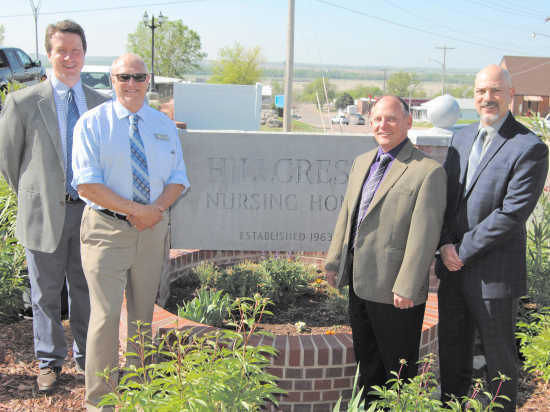Clinic, hospital, nursing home join forces for better care

McCook, Neb. — Administrators from Hillcrest Nursing Home, McCook Clinic and Community Hospital are finding quarterly collaboration meetings improve processes of care for area patients who use services between their organizations. Their goal is to provide better care for some in perhaps the most vulnerable stage of life.
Brad Cheek, Hillcrest Administrator, Brian Rokusek, McCook Clinic Practice Administrator and Troy Bruntz, Community Hospital President & CEO say they are developing new ideas to improve efficiencies and communication as Hillcrest patients access their services.
For instance, one goal they have established is for residents from Hillcrest to have a follow up visit with a McCook Clinic provider within three to five days of discharge from Community Hospital. This will continue the continuity of care for a better transition, and add to the commitment and dedication of quality care, they said. “With timelier follow ups, we hope to reduce the chance of readmission to the hospital,” Bruntz added.
They also want to offer joint education for nurses from all the facilities. Some of the education involves bringing training to McCook to assist with nursing requirements for ongoing licensure. But the administrators are also looking at community disaster drills and educational opportunities involving non-licensed staff.
Finally, they want to improve communication between the organizations.
“Improved or enhanced communication between our medical staff, physicians and caregivers, helps to avoid potentially preventable events, such as unnecessary ER visits, unnecessary hospitalizations and unnecessary clinic visits,” said Rokusek. He added that extra visits and transfers are hard on elderly patients; some have at least eight transfers from bed to wheelchair to van, etc., just for one doctor’s visit at the clinic. Embedded care coordinators at McCook Clinic are working with their patients who reside at Hillcrest to reduce unnecessary readmissions, visits and transfers to the clinic and hospital. This limits the patient’s distress and exhaustion.
To also reduce trips outside the facility, physicians and therapists come to the residents. Dr. John West, Hillcrest’s new medical director, as well as all the family medicine physicians from McCook Clinic see patients at Hillcrest at least one half day per month. Also providing services at Hillcrest are Community Hospital physical, speech and occupational therapists.
Other ways to improve communication and education are less conventional, such as McCook Clinic nurses shadowing Hillcrest nurses. “That would help them to recognize work flow and processes that happen at each facility,” Rokusek said. “Not only providing information and knowledge, but getting to know each other better; all leading to a more interactive team.”
Besides the administrators, which have met at least twice, other teams have been created. The Transition of Care team is made up of nurses and social workers working in partnership between the facilities. Also, Whitney Kuhlen, Director of Nursing for Hillcrest has been meeting with Jane Backer, McCook Clinic Director of Nursing for the same purpose. “All of this to enhance overall health of our long-term care population,” Rokusek said.
They are also encouraging the use of the electronic patient portal, Follow My Health,—the same portal is used at McCook Clinic and Community Hospital—to enhance communication between hospital, clinic and Hillcrest “A Caring Center.” The portal allows caregivers to view tests and lab results from both the clinic and the hospital to aid in the residents’ care.
“Our meeting together has strengthened our bond,” said Cheek. “We are committed to the health and the well-being of our community. Through our continued collaboration meetings we are developing new ideas,” he added.
“It’s about playing a leading role,” said Bruntz. “It’s about the patient; they get better care because of our ability to collaborate.”
